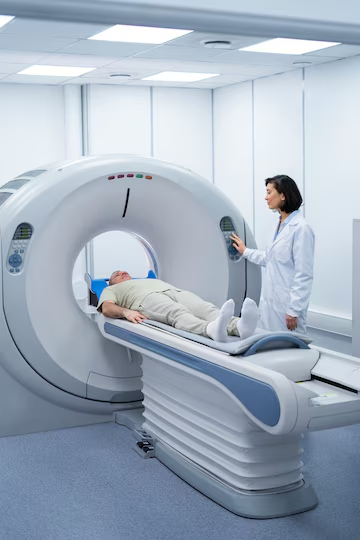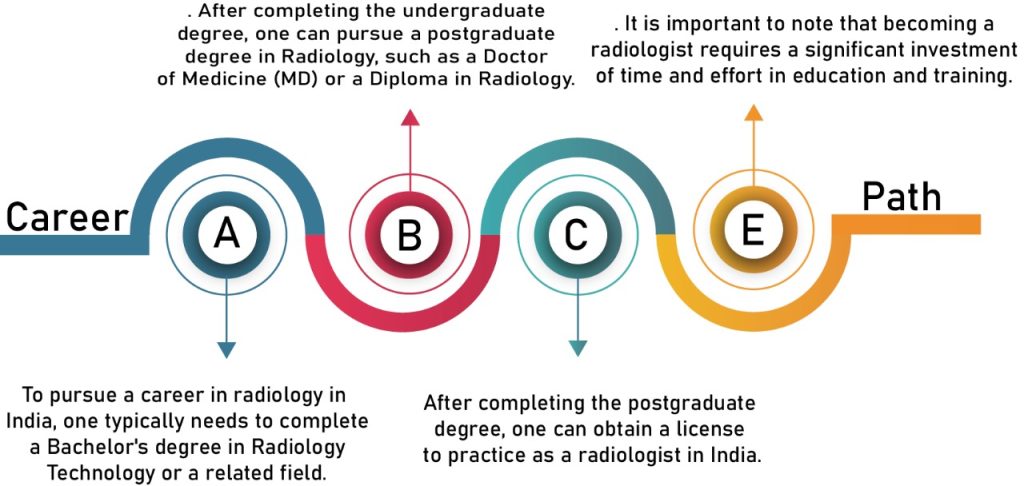Radiology is a branch of medicine that uses medical imaging techniques to diagnose and treat diseases or injuries within the body. Radiologists use a range of imaging technologies, such as X-rays, ultrasound, magnetic resonance imaging (MRI), computed tomography (CT), and positron emission tomography (PET) to produce detailed images of the internal structures of the body. These images can help diagnose and monitor a variety of conditions, including broken bones, tumors, and other abnormalities. Radiology is an essential part of modern medicine, and it plays a critical role in helping doctors provide accurate diagnoses and effective treatments for their patients.

Work description
Radiologists are medical doctors who specialize in diagnosing and treating diseases and injuries using medical imaging techniques. Their work involves interpreting the images produced by X-rays, CT scans, MRIs, ultrasound, and other imaging technologies to identify abnormalities and diagnose medical conditions.
Radiologists also work closely with other healthcare professionals to develop treatment plans for patients, which may include radiation therapy or other interventions.
In addition to their diagnostic and treatment responsibilities, radiologists may also perform minimally invasive procedures, such as biopsies, using imaging guidance.
High Demand
Radiologists are in high demand due to the growing need for medical imaging in healthcare.
Competitive salary
Radiologists typically earn high salaries due to the specialized nature of their work.
Intellectual challenge
Radiology requires a high level of medical knowledge and the ability to interpret complex imaging data, making it intellectually stimulating.
Constantly evolving field
With advancements in technology, radiology continues to evolve, offering opportunities for professional growth and development.
Flexibility
Radiology offers opportunities to work in various settings, including hospitals, clinics, and private practices.
Job satisfaction
The potential to specialize in areas such as sustainable design, structural engineering, or building systems design.
High level of responsibility
Radiologists have a high level of responsibility, as their work directly impacts patient outcomes.
• Potentially long work hours
Radiologists may work long hours, particularly in hospitals or emergency settings.
Risk of radiation exposure
Radiologists may be exposed to radiation over long periods, which can pose a health risk.
High education and training requirements
Becoming a radiologist requires a significant investment of time and money in education and training.
High stress
The need to stay up-to-date with evolving technologies and industry trends, which may require ongoing education and training.
Eye strain and other physical health issues
Radiology can be a high-stress job, particularly when working with critically ill patients or in emergency situations.
The cost of pursuing a career in radiology in India can vary depending on the educational institution and location.
Typically, a bachelor’s degree in radiology technology can cost between INR 50,000 to INR 1,50,000 per year, while a postgraduate degree in radiology can cost between INR 5,00,000 to INR 15,00,000 per year.
Additional costs may include fees for books, equipment, and practical training. However, these costs can be reduced through scholarships and financial aid programs. It is important to note that the cost of pursuing a career in radiology in India can be significant, but the high demand and earning potential of radiologists can make it a worthwhile investment.
[wpcharts type=”horizontalbarchart” bgcolor=”red:gray:yellow,blue:gray:yellow,random:gray:yellow,purple:gray:yellow” min=”0″ legend=”true” titles=”2 year , 5 year” values=”3,7,5,12″]
Radiologists in India typically earn high salaries due to the specialized nature of their work. According to various reports, the average annual salary of a radiologist in India can range from INR 7,00,000 to INR 25,00,000 or more, depending on factors such as experience, education, location, and employer. Radiologists working in private hospitals or clinics may earn higher salaries compared to those working in government hospitals. Additionally, radiologists with specialized skills, such as interventional radiology, may earn even higher salaries.
[wpcharts type=”horizontalbarchart” bgcolor=”red:gray:yellow,blue:gray:yellow,random:gray:yellow,purple:gray:yellow” min=”0″ legend=”false” titles=”Entry-Level, Mid-Career, Senior-Level ” values=”5,15,25,35,45,55″]
Strong academic record in science and math.
Attention to detail and strong analytical skills.
Ability to work well under pressure and in high-stress situations.
Good communication skills to interact with patients and other healthcare professionals.
Good hand-eye coordination and technical skills for performing imaging procedures.
Good hand-eye coordination and technical skills for performing imaging procedures.
Ability to work well in a team environment, collaborate with others, and provide leadership when necessary.
Inability to handle the sight of blood or bodily fluids
Lack of empathy or compassion for patients
Inability to work in a team or collaborate with other healthcare professionals
Poor hand-eye coordination or difficulty with technical tasks
Poor hand-eye coordination or difficulty with technical tasks
Inability to handle high-stress situations or make quick decisions under pressure.
A lack of attention to detail, which can lead to errors and safety issues in designs.
Work-life balance
The work-life balance of a radiologist can vary depending on factors such as work setting, specialty, and personal preferences.
Generally, radiologists in India work long hours, particularly in hospitals or emergency settings. However, radiologists in private practice may have more control over their schedules and may be able to achieve a better work-life balance.
Radiologists may also have to be on call or work irregular hours, which can impact their personal time. However, many radiologists find the work rewarding and stimulating, and the ability to make a difference in patient outcomes can be a source of professional fulfillment.
Overall, a radiologist’s work-life balance can be challenging, but with proper time management and support, it is possible to achieve a balance between work and personal life.

Radiologists play a crucial role in diagnosing and treating various medical conditions.
The demand for radiologists is increasing due to the growing need for medical imaging and technology.
Radiology is a lucrative field with high earning potential.
Radiologists have opportunities for career advancement and specialization.
Radiology can be intellectually stimulating and provide opportunities for continued learning and professional growth.
Radiology can also be emotionally rewarding, as radiologists have the ability to make a significant impact on patient outcomes.
Diagnostic Radiology
Focuses on using imaging technologies such as X-rays, CT scans, and MRI scans to diagnose and evaluate medical conditions.
Interventional Radiology
Involves using imaging technologies to guide minimally invasive procedures to treat medical conditions such as cancer, blockages, and infections.
Nuclear Medicine
Involves using radioactive substances to diagnose and treat medical conditions.
Pediatric Radiology
Specializes in imaging children and diagnosing medical conditions specific to pediatric patients.
Emergency Radiology
Involves using imaging technologies to diagnose and treat medical emergencies in emergency departments or trauma centers.
Conclusion:
In conclusion, radiology is a rewarding and challenging career path that offers a range of specializations, high earning potential, and opportunities for professional growth. Radiologists play a vital role in diagnosing and treating various medical conditions, and the demand for skilled radiologists is on the rise. While pursuing a career in radiology requires significant investment in education and training, the rewards of making a difference in patient outcomes can be emotionally and professionally fulfilling.



